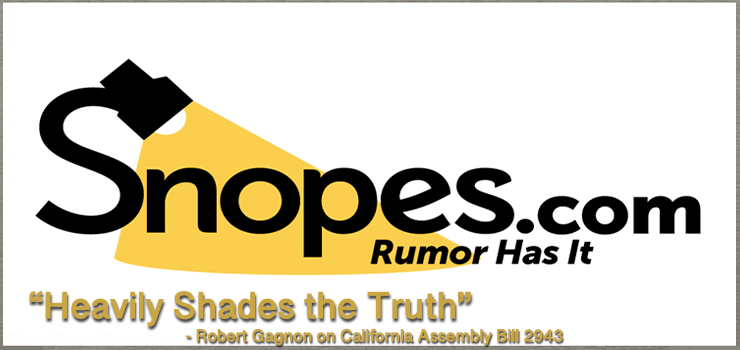Kerby Anderson
How accurate are fact checkers? Many fact-checking sites are tied to newspapers, and others are independent operations. Often they provide a valuable service. Sometimes though, the fact checkers need to be fact-checked. Such was the case with Snopes, which is one of the best-known fact-checking sites.
Snopes did an analysis of one of the criticisms of California Assembly Bill 2943, which has been making its way through the legislature. The bill would prohibit the sale and distribution of books and counseling that is aimed at helping people overcome their same-sex attraction.
One member of the California Assembly (Travis Allen) wondered, “If this bill were to pass, would this prohibit the sale of the Bible, that teaches these things about sexual morality?” Snopes rejected the statement saying the bill “does not mention the Bible, Christianity, or religion at all” and concluded the statement was “demonstrably and clearly false.”
Robert Gagnon, writing in The Federalist, acknowledges that the bill doesn’t mention the Bible, but explains that is irrelevant. “Sure, it is virtually impossible that California will immediately attempt to ban the sale of the Bible itself. Not even the hard left in California has that kind of chutzpah. But citations of Bible verses in the context of declaring homosexual practice and transgenderism to be morally debased could indeed get one into serious trouble with the law if it comes in the context of selling or advertising a product or service.”
He concludes that Snopes “heavily shades the truth.” He then suggests, “Read the bill. There is no religious exemption. There is no restriction to mental health professionals.”
This bill in the California legislature is much worse than the fact checker would have you believe. It may not ban the Bible, but it would certainly ban all sorts of books and counseling in the name of promoting the homosexual agenda.
 Listen Online
Listen Online Watch Online
Watch Online Find a Station in Your Area
Find a Station in Your Area












 Listen Now
Listen Now Watch Online
Watch Online
